With just one move, the highly anticipated shift of power to the next generation of the Nehru-Gandhi family has come about, albeit silently, explains Sheela Bhatt
August 15, 2011, will witness the first Independence Day celebrations after Rahul Gandhi, fifth generation of the family of eminent freedom fighter Motilal Nehru, takes charge of the 126-year-old Congress party.
The power has shifted at the top in the oldest and biggest political party of India without the usual band-baaja and laddoos due to the serious health problems of Congress President Sonia Gandhi.
The secretive Gandhi family has neither told the people nor most of its party leaders what Sonia Gandhi's ailment is, where she was operated on and why the details are being kept secret.
If, as they are claiming now, she is recovering fast then the Gandhi family and their loyalists should not be hesitant in sharing such information. However, their preference for privacy is absolutely in sync with Sonia Gandhi's trajectory in public life.
From the nation's point of view, the historical news is that she herself has shifted Rahul Gandhi from the Youth Congress to its parent party.
Sonia Gandhi has played her cards shrewdly
Image: A poster of Rahul GandhiAs she is abroad, there is an underlying and fully understandable tension within the Congress over whether Sonia will get well soon. A large section of the party, cadre, leaders and operators in the Congress believe that the Gandhi dynasty is the binding force of the party that keeps groupism under control.
The sudden and slightly shocking news of Sonia's serious sickness had the potential to trigger lots of speculation and could have led to premature intra-party wars which were already going on, even in her presence.
Congress leaders, who support the Gandhi dynasty, don't want claimants to arise for the control of the party which is not even available in the foreseen future.
Two recent opinion polls, one by CNN-IBN and another by India Today, suggest that even people expect Rahul Gandhi to lead the country and he is becoming the acceptable face of the Congress.
Still, in view of the real possibility of power politics, Sonia Gandhi has played her cards shrewdly. Her formation of the 'group of four' with top Congress leaders is as cunning as the selection of Manmohan Singh to lead the central government in 2004.
It is notable how with just one move, the highly anticipated shift of power to the next generation of the Nehru-Gandhi family has come about, albeit silently. She has also silenced nearly half dozen Congress aspirants for the prime minister's and party president's posts, if and when she demits office.
Rahul will formally take charge of the party
Image: Congress leader Rahul GandhiIn a few hours from now, as reported, when Rahul Gandhi's flight touches down in New Delhi, back from the place where his mother is recuperating, he will be a different leader. He will formally take charge of the party.
Reports indicate that if he comes back from abroad, he will hoist the flag at 24, Akbar Road (Congress party's headquarter in Delhi) and he may fly back again to be with his mother.
A highly reliable source in the party told rediff.com that Sonia Gandhi had taken the decision of forming the core committee in the party after taking lots of factors into consideration. She handed over her power to run the party's affairs to her son Rahul Gandhi, Defence Minister A K Antony, spokesperson Janardan Dwivedi and her political secretary Ahmed Patel.
There is now not an iota of doubt that these four are the chosen ones who hold her trust. The famous Nehru-Gandhi legacy is entrusted in their hands.
Three of them -- Antony, Dwivedi and Patel -- are Congressmen who Sonia thinks will not plot, manipulate or maneuver for themselves the top position within the party (president) or the government ( prime minister) and will protect and enhance the political interest of Rahul Gandhi.
Her thought process, which is always a highly guarded secret, has become public in the unforeseen circumstance of her illness.
Sonia chose Antony, Patel and Dwivedi
Image: Sonia Gandhi's political secretary Ahmed PatelBut no step was taken in haste. Before leaving for treatment, she had consulted Finance Minister Pranab Mukherjee, the senior-most leader and political trouble shooter of the party.
On August 4, Patel had called up many media personnel to tell them that Mukherjee had not been included in the 'group of four' as he was handling duties in Parliament. But there are no takers for this 'alibi'.
A truly major change has been ushered in national politics through Rahul Gandhi, who was not "interfering" much in the daily management of the parent party. But now, after his return from abroad, he will handle its affairs officially.
It's interesting to note how Sonia has chosen Antony, Patel and Dwivedi over other Congress leaders.
The common factor amongst these three, obviously, is that they are "loyalists.' All three are "humble" in their private interactions. All three operate without fanfare and noise. All three are low-profile even though they carry weight in Sonia's darbaar. That's suitable to the style of politics Sonia Gandhi herself practices within the party.
Antony offers opinion that he believes in
Image: Defence Minister A K AntonyPatel and Dwivedi are not even mass leaders and they don't have the political ambition that other Congress leaders like P Chidambaram or Digvijay Singh nurture. Patel, as the political secretary of Sonia Gandhi and an old guardian of Gandhi family's interests, is part of the group for obvious reasons.
But Dwivedi's ascent has not gone unnoticed.
Those who know Dwivedi since the days of former prime minister Indira Gandhi are aware that like Antony and Patel, he is also not a blind follower of "Manmohanics".
His political views on various issues like caste politics, communal harmony or strategy for political alliances are quite similar to Antony and Patel. In that sense, Antony, Patel and Dwivdi make a cohesive and homogenous group. All three have the patience to acquire power.
In the case of Antony, he is not the decision-maker but he is quite frank and offers opinion that he believes in, to Sonia Gandhi.
In fact, a much less debated fact is that one of the leaders had told Sonia, after the Lok Sabha election in 2009, to not form the Congress-led United Progressive Alliance government again.
Congress leader had warned Sonia about UPA-2
Image: Prime Minister Manmohan Singh with Congress president Sonia GandhiHis argument was that the Congress had not got a majority of its own and the compulsions of coalition politics will not allow it a free hand to run the show.
More importantly, his argument was that the Congress, under the leadership of Sonia, had implemented its best ideas in the form of the National Rural Employment Guarantee Act, the Right to Information Act, the Bharat Nirman yojna and the policy of waiving off farmers' loans. There was not much a Congress leader like Sonia Gandhi could do in addition to that.
If Congressmen struggled outside the corridor of power, it would have helped the party consolidate the gains of the first term of the UPA, the leader believed.
According to the argument, any khichdi government of 2009 without the Congress's support would not have been able to run the show. After the early collapse of a non-Congress government, the party would have created for itself a bright chance of coming back to power with a thumping majority.
The drift of UPA-2 is not very unexpected for some leaders in 24, Akbar Road. This group is close to Sonia. But such ideas were buried under the increasing greed for power after the surprise win of the UPA.
Also, one fact should be recalled here that in Manmohan Singh's Cabinet, Antony had major ideological differences with the PM between 2006 and 2009.
Dr Singh's fan-club had dubbed him the "dinosaur" who had resisted fast-track economic reforms.
Janardan Dwivedi's patience has paid off
Image: Congress spokesperson Janardan DwivediIn view of these factors, Sonia's selection of Antony, Dwivedi and Patel is a signal of where Sonia's support lies in politico-economic issues.
Though Rahul Gandhi has more in common with Prime Minister Manmohan Singh's world view, the manner in which he has taken up the issue of land acquisition and rights for tribals may make him feel more comfortable in the company of the newly-formed troika of Antony-Patel-Dwivedi. They represent the old Congress and not the forces within the party that heralded economic reforms for the country.
Dwivedi's inclusion has surprised many. He has been a member of the All India Congress Committee since the last 33 years and will soon be marking 50 years of his political career. He is the silent leader whose secret support to his peer group in the hard fought intra-party battles has always been crucial. He is the party secretary who has been patient since the last 33 years while stationed at the party headquarter.
To be fair to him, his current position is not due to imparting Hindi lessons to Sonia, as his critics claim, but it's his patience that has paid off.
Like Patel and Antony, one has never heard of Dwivedi boasting about his political clout. He has steadfastly stuck to the politics of centre, which he represents in Sonia Gandhi's darbaar.
Ahmed Patel, say his critics, in a shrewd move has anchored the old Congress with the 20th-century mindset to the Congress leader of 21st century through this event.

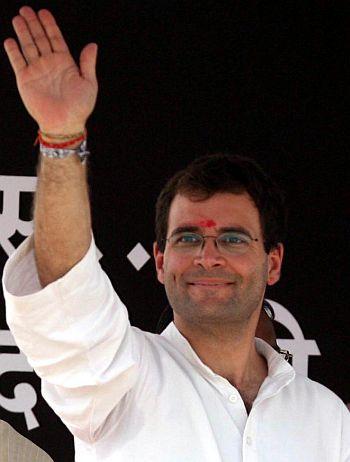
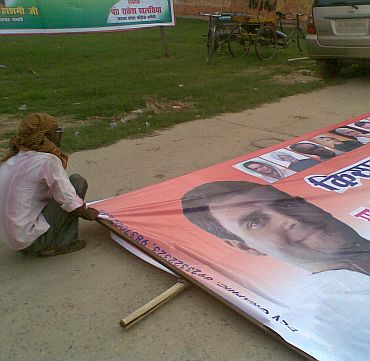
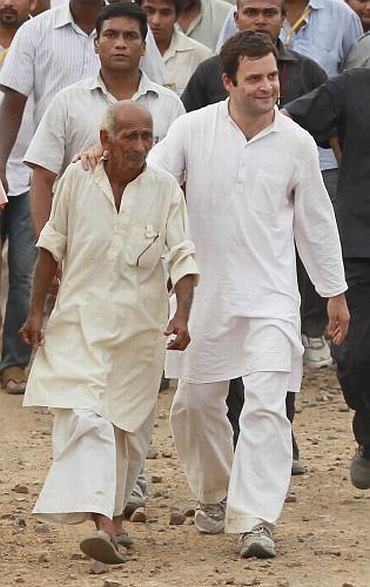
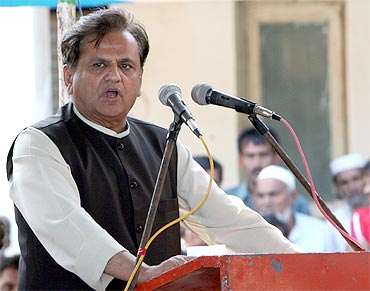
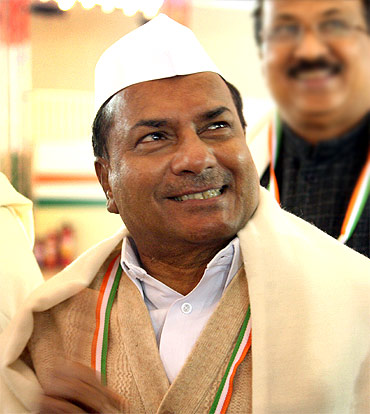
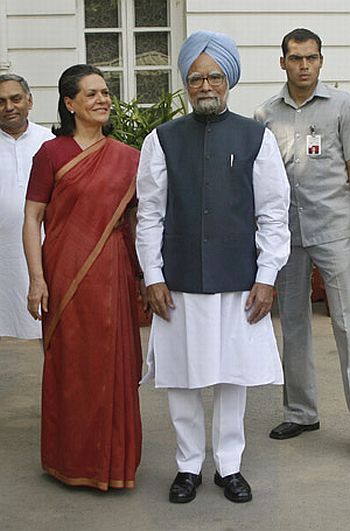
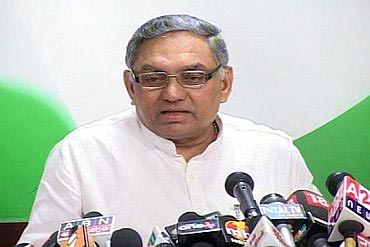
article